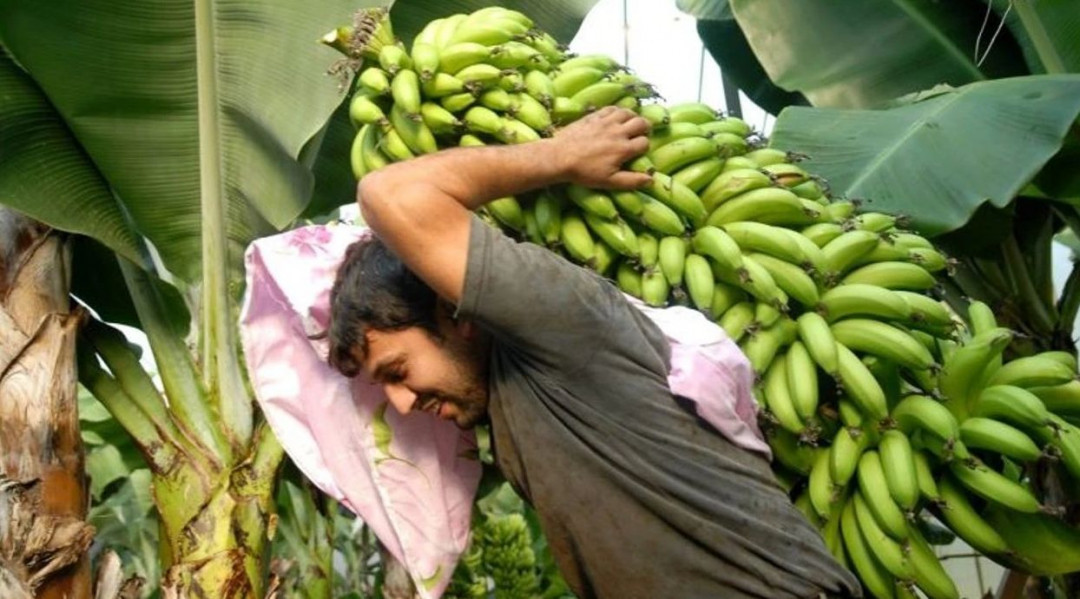Producers in Alanya are turning away from bananas

Farmers in Alanya have started dismantling their banana greenhouses due to increasing costs and declining profits, shifting toward cultivating more profitable crops like mangoes and avocados.
Once considered a luxury fruit, bananas are now among the cheapest fruits available. Previously appealing only to higher-income groups, bananas are now sold at lower prices than many other fruits in markets. While this is good news for consumers, it has created serious challenges for producers. Green bananas grown in open fields are purchased from producers for 26 TL per kilogram, while greenhouse bananas are sold for 28 TL. At wholesale markets, ripe bananas cost between 33 and 37 TL, while retail market prices range from 40 to 50 TL per kilogram, making bananas more affordable compared to apples and oranges.
Banana producers complain about rising costs and the inability of sale prices to cover expenses. Increasing prices for essential inputs such as fertilizers, pesticides, and labor have significantly reduced profit margins. Because bananas no longer yield the returns they once did, producers are shifting to crops like mangoes and avocados. With banana prices falling, farmers in Alanya are replacing greenhouses with these more profitable tropical fruits. Moreover, climate change and uncertainties in agricultural policies pose additional challenges for producers. Industry representatives emphasize the need for balanced agricultural policies to protect producers. They warn that without support for domestic banana production and a balance in imports, local producers may exit the sector.
IMPORTS SHOULD BE BANNED OR IMPORT TAXES INCREASED
Tahir Göktepe, President of the Alanya Chamber of Agriculture, highlighted the importance of banana production in Alanya and called on authorities to address the issues faced by domestic producers. Göktepe stressed that Alanya serves as a hub for banana distribution to surrounding districts and provinces. He urged government officials and relevant ministries to support local banana producers, proposing a complete ban on banana imports or an increase in import taxes during the peak domestic production period from September 1 to May 30.
“Banana production in Alanya encompasses 12,000 decares of greenhouses and 9,500 decares of open fields. Alanya is where bananas originated in Turkey and are distributed to neighboring areas. This makes bananas extremely important both for our district and for the country, not only because of their taste and aroma but also for the employment they provide. However, due to high initial investment and ongoing operational costs throughout the year, our producers are struggling with rising input costs while continuing production.
Unfortunately, bananas remain the cheapest fruit on the market, which discourages production and prompts a shift to other high-value crops that can be grown under greenhouses. Although we produce 140,000 tons of bananas annually in Alanya, fertile lands still remain unused. When compared to apples, pears, oranges, mandarins, and other fruits, bananas are five times more expensive in terms of both investment and operational costs.
We urge the government and ministries to prohibit imports or increase import taxes during the peak domestic production period of September 1 to May 30. We also ask consumers to support local producers, who work tirelessly to deliver safe, pesticide-free food from the fields to their tables. When shopping, we urge them to choose domestic bananas and other fruits and vegetables,” Göktepe said.
SURPLUS PRODUCTION LEADS TO PROBLEMS
Adem Kaya, President of the Alanya Wholesale Market Traders Association, pointed to unplanned credit policies as the cause of surplus production. Kaya said, “Bananas are not being sold at their deserved value. Costs have increased significantly, and the main reason for the low prices is the excess production of bananas in the country. If only credit allocation had been planned during the provision of low-interest loans, this wouldn’t have happened. Perhaps some banana producers will be upset with me, but if these loans had been given only to family farmers and those with low incomes, the situation would be different. Unlimited credit was provided to large companies without proper research or oversight, resulting in the construction of extensive greenhouses and surplus production, which has now led to losses.”
RISING COSTS, STAGNANT INCOME
Prof. Dr. Süleyman Uyar, Head of the Business Administration Department at Alanya Alaaddin Keykubat University (ALKÜ) Faculty of Economics and Administrative Sciences, also a farmer, noted that surplus production has driven prices down while costs continue to rise.
“Today, bananas have become one of the cheapest fruits. Just yesterday, I saw strawberries priced between 400 and 600 TL per kilogram, which means a single strawberry costs around 23 TL when considering its weight. In the past, bananas and strawberries were similarly priced. However, banana prices have not increased for years. The main reason for this is the relationship between supply and demand. If supply increases, prices decrease, which is exactly what happened with bananas.
During the pandemic, low-interest loans led to a significant increase in banana production, reaching almost 900,000 tons. Now bananas are easily accessible everywhere, unlike before when they were a rarity. Bananas have become one of the cheapest products.
Since bananas cannot be stored for long periods, they must be sold upon production. This often results in early harvests as producers struggle to find buyers. Even though prices are reasonable, the amount of bananas people consume is limited. For producers, the more pressing issue isn’t 'Why aren’t banana prices rising?' but 'Thankfully, bananas are selling.' If sales were to stagnate and prices were to drop further, the situation would worsen.
However, stagnant prices and rising costs are already problematic for producers. Wages, energy expenses, and fertilizer costs have skyrocketed. For example, producers used to afford workers when minimum wages were between 7,000 and 10,000 TL. Now, with minimum wages at 17,000 TL and expected to exceed 20,000 TL in January, it is becoming increasingly challenging. The cost of foreign labor has also increased. Greenhouses rely on engines, and expenses for pesticides and fertilizers are rising, but sales prices remain unchanged.
Many producers continue growing bananas out of habit, but some are turning to alternative crops like mangoes and avocados. For example, zucchini production has been incredibly profitable this year. Many farmers now say, 'I wish I had planted zucchini; I would have earned much more in 3-4 months than I would with bananas.' This underscores issues of supply-demand imbalance and a lack of planning,” Uyar explained.


